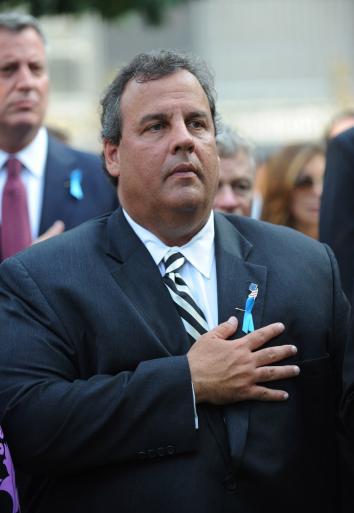The political calculation of New Jersey Gov. Chris Christie’s surrender on gay marriage—he announced yesterday he would drop his appeal of a court’s ruling that finally allowed gay couples to wed—is not hard to decipher. As a likely GOP presidential candidate for 2016, Christie must woo the party’s anti-gay right wing to win the primary, and avoid, for the general election, seeming out of step with the dramatic national movement toward marriage equality. So he has consistently opposed gay marriage personally while stating that he would support it if the state’s populace did so in a vote.
The press has let Christie off lightly on what’s become a crucial test of a national political leader’s mettle. The governor has repeatedly gotten away with talking out of both sides of his mouth on this issue, and has never been pinned down on the actual basis for his beliefs, saying he simply believes marriage is between a man and woman, without ever being asked to explain why. His slipperiness on the issue, which his brusque, unapologetic manner makes seem principled, when it’s anything but, would have earned far more scrutiny if it came from a Democrat, given that party’s reputation for waffling.
Consider the statement Christie’s administration put out yesterday when he dropped the legal appeal: “Although the governor strongly disagrees with the court substituting its judgment for the constitutional process of the elected branches or a vote of the people, the court has now spoken clearly as to their view of the New Jersey Constitution and, therefore, same-sex marriage is the law. The governor will do his constitutional duty and ensure his administration enforces the law as dictated by the New Jersey Supreme Court.” So Christie is dismayed by the court “substituting its judgment for the constitutional process of the elected branches.” Huh? Last year Christie vetoed the legislature’s passage of a gay marriage bill, thwarting the will of the elected legislature. It has quickly become the will of the people, as New Jersey voters favor gay marriage by a 2-to-1 margin.
True, the governorship is also an elected branch, and the governor was within his constitutional right to exercise his veto. But then, so was the court. If Christie’s bar is “the constitutional process,” his lament about the courts is pure nonsense. Since when does the constitutional process include only elected branches? Now, it is possible to disagree with a court’s constitutional interpretation of a case and still follow the court’s order, as any governor must. But that’s not what the Christie statement says. It doesn’t say the governor interprets the court case differently than the judges but that he believes the court ought not issue a judgment on the marriage issue at all. How, exactly, would that be following the constitutional process? Using the worst kind of demagoguery, Christie hits the most simplistic of right-wing talking points about unelected judges and ultimately relies on an assertion of his own belief. And in our political dialogue, saying you believe something is enough to stop serious questioning in its tracks.
Now that both the state’s high court and more than 60 percent of its voters have said gay marriage should be legal, and Christie has stopped his fight to block it, the questions he should be asked are even more interesting. Does the change mean he was wrong to believe marriage should be reserved for straights? Just why, exactly, did (or does) he think marriage should be reserved for straights? This is a key question too often lost in our national debate. Christie would have us believe his views on marriage are just a belief, perhaps rooted in religion, but ultimately no different from a personal preference, like whether you opt for chocolate or vanilla ice cream, or decorate your living room in red or yellow. It is (perhaps not ironically) a claim that opposition to gay equality is as frivolous and unconnected to fact or consequence as many used to regard being gay itself. Asked recently how he’d respond to having a gay child, Christie said he’d “tell them I love them,” but he’d also say that “Dad believes that marriage is between one man and one woman.” He explained that his children “understand that there are going to be differences of opinion in our house and in houses all across this state and across this country,” and he argued that those differences should be respected.
But this is the ruse social conservatives have gotten away with for years, now wrapping their views in the mantle of “religious freedom,” which is not only an effort to gain legal protection for their position but to further preclude substantive discussion of the issue. If it’s all just a preference, like whether to go hiking or skiing this weekend, there’s really no basis for debating what’s right or wrong. But the marriage debate isn’t like the debate over the death penalty or abortion, where two conflicting rights or goods are pitted against each other. (Social conservatives’ “right” to not let others marry is a fake right.) And it’s not like the question of whether to spend taxpayer money to build a new stadium, or other questions of social priorities that properly lend themselves to public referendum. Opposition to marriage equality is not a question of prioritizing one good or right over another, notwithstanding rationalizations to the contrary. It boils down to one group imposing its feelings of disgust onto another, and politicians pandering to those feelings for political gain.
That’s why the question asked at the recent gubernatorial debate, about why Christie believes marriage should be decided by popular vote is the wrong question. The right question is why he believes that gay marriage is wrong. It’s time to stop using “belief” as a way to end discussion and to start using it as way to begin it.
